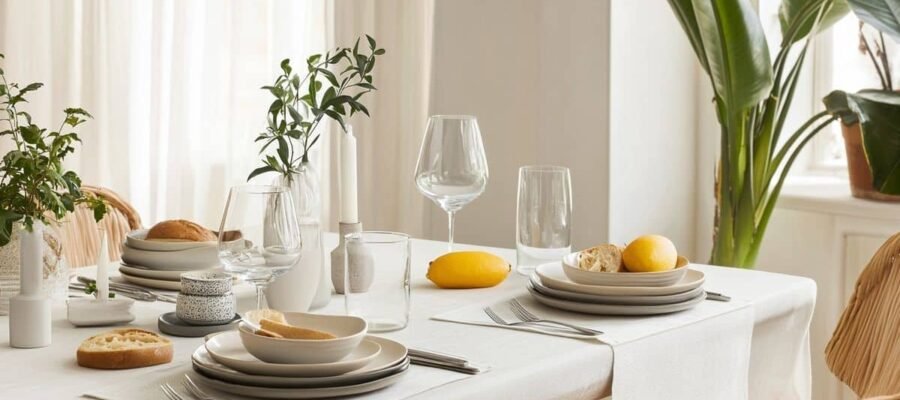After a big meal, the kitchen can quickly feel like a battlefield. Food scraps, sticky surfaces and lingering odors are all challenges to overcome. Fortunately, some simple habits help maintain optimal cleanliness, even after the busiest meals. Here are three proven ways to transform your cooking routine.
1. Prepare ingredients strategically
Arrange foods in layers
The key to a clean kitchen is planning phases. Before you start cooking, sort the ingredients by consistency and usage. Arrange liquid or moist foods (such as sauces or washed vegetables) at the bottom of the containers, then layer drier foods. This technique, often used for mason jar salads, keeps the leaves from getting soggy.
Concrete example :
- The rear bottom can : Vinaigrette, chopped tomatoes, avocado.
- Intermediate layers : Cheeses, olives, crunchy vegetables.
- Above : Fresh salad leaves.
This method also applies to the preparation of complex dishes, separating the hot elements from the others to limit protrusions.
2. Systematically clean after every meal
Adopt an immediate cleaning routine
THE dirty dishes and the dirty surfaces they are the number one enemy of a clean kitchen. To avoid their accumulation, establish a golden rule : clean immediately after each use.
Key steps for effective cleaning
- Wash utensils : Fill the sink with hot, soapy water to soak sticky containers (like caramel casseroles). Leave on for 5 to 10 minutes before scrubbing.
- Disinfect surfaces : Use a damp cloth to clean shelves, cabinet handles and cutting boards. These areas are bacteria nests if they are not treated regularly.
- Manage waste : Empty the bin after each meal and clean the lid with a mixture of water and vinegar to remove residues.
Bonus tip : For sticky foods (marshmallow, caramel), fill the container with boiling water and let it soak before cleaning.
3. Use natural tips to control odors
THE persistent aromas (fish, onions, spicy cheeses) can become encrusted in refrigerators and on surfaces. Fortunately, there are natural solutions to neutralize these odors.
The natural allies of your kitchen
| Ingredient | Usage | Effect |
|-|–|–|
| Coffee grounds | Place in an open bowl in the refrigerator | Absorbs odors |
| Citrus peel | Display in bouquets or vases | Neutralizes perfumes |
| Fresh thyme | Place in a cloth bag | Purifies the air |
| Cedar | Cut into quarters and display | Deodorizes refrigerators |
Effective method :
- Clean the fruit : Soak them for 10 minutes in water with 1 cup of vinegar to kill bacteria and prolong their shelf life.
- Pain Grid : Brown the slices of stale bread in a pan to neutralize the fish or vegetable smells.
4. Maintain strict hygiene
Protect from recontamination
Even a clean kitchen can be compromised imprudent actions. Here’s how to avoid common mistakes:
Errors to be banned
- Manage your phone during preparation: The latter is often contaminated by external bacteria. Wash your hands after every contact.
- Forgetting to clean the handles : These areas are microbial vectors. Disinfect them daily.
- Neglect cutting boards : Use a wooden cutting board for meats and a plastic one for vegetables to prevent bacteria from crossing.
Recommended routine :
- Wash your hands before and after any food handling.
- Disinfect surfaces with a solution of water and vinegar (1:1).
- Check regularly refrigerator seals and shelves to remove residue.
5. Optimize your storage space
Organize food to limit spills
A messy kitchen encourages dirt. Here’s how rationalize the space :
Practical solutions
- Use airtight containers : Store cereals, spices or biscuits in labeled containers to avoid crumbs.
- Reserves update : Throw away expired food and divide products by category (dry, fresh, frozen).
- Clean the shelves : Clean storage surfaces weekly with a damp cloth.
Advantage : An organized kitchen reduces cleaning times and limits the risk of contamination.
6. Anticipate large meals
Prepare a cleaning strategy in advance
Parties or family gatherings often generate significant waste. To avoid overloading, plan your cleaning :
Checklist before a large meal
- Empty the garbage : Replace the bag before starting cooking.
- Prepare the containers : Take out pots, boards and storage containers.
- Clean devices : Disinfect the microwave, oven and coffee machine.
- Prepare a clearing area : Reserve a corner of the kitchen for empty packaging and leftovers.
Result : A free work space and quicker cleaning at the end of the meal.
7. Recycle leftovers smartly
Transform unsold items into new dishes
Leftover food can increase your workload. Here’s how value :
Creative ideas
- Save cooked vegetables : Use them in soups, omelettes or savory pies.
- Freeze sauces : Pour them into ice cube trays to reuse them later.
- Create compost bowls : Mix leftover meat, rice and vegetables for a quick meal.
Advantage : Reduce waste and save time.
8. Train the whole family
Involve your loved ones in the routine
Cleaning becomes easier when everyone participates. Here’s how to set up a cultural collective :
Roles to distribute
- Children : Put away the cutlery, clean the tables.
- Teenagers : Load the dishwasher, empty the garbage.
- Adults : Clean complex surfaces, disinfect sensitive areas.
Educational tools :
- Create a task table : View daily activities for a clear breakdown.
- Organize challenges : “Who cleans fastest?” to make the process fun.
9. Invest in proper equipment
Choose tools that make cleaning easier
Recommended materials
- Granite or stainless steel worktops : Easy to clean and stain resistant.
- Stainless steel sinks : Durable and hygienic.
- Pedal bins : Limit manual contact.
- Hard bristle brushes : For scraping sticky containers.
Advantage : Surfaces resistant to daily aggressions.
10. Schedule cleaning breaks
Integrate micro-cleaning into your day
Rituals to adopt
- After every meal : 5 minutes to clean surfaces and put away utensils.
- Before going out : Check that all areas are clean.
- In the evening : Thoroughly clean neglected areas (oven, refrigerator).
Result : A kitchen that remains impeccable without effort.
A clean kitchen after a heavy meal is not a myth. Combining strategic preparation, systematic cleaning et natural adviceyou turn a chore into a manageable routine. These methods, tested and validated by experts, fit all budgets and lifestyles. The main thing? Persevere : every small gesture counts to maintain optimal hygiene.
latest posts published

Waterfall table: refinement for your home

Using hexagonal screen in decorative furniture

Decorating trends for 2023!

Color trend for 2023 in your home

Luxury Furnishings: Refinement and Exclusivity for Unique Environments

Balconies become essential in a good apartment

João Gasparini Building: the perfect environment for your company

Buying Modern and Luxury Sofas: Transforming your Home

The 5 types of sofas to choose from and furnish your home


